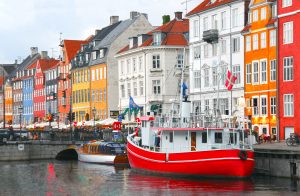Cities in focus - Copenhagen

Denmark is the second happiest place in the world, the easiest country to do business in and one of the most digitised economies and societies in the EU.
The country’s small and integrated population is quick to adopt new technologies, making Denmark an ideal location for companies looking to develop and test new technologies before expanding internationally.
85% of Denmark’s population is online and actively using digital services. Less than 2% have never used the internet, and only 3 out of 10 lack digital skills. Denmark’s tech-savviness and robust IT infrastructure provide the country with a solid foundation for becoming a leading tech ecosystem.
Denmark has a global footprint in software development. Some of the most used programming languages like C++, TurboPascal and Visual Prolog have been developed by Danish researchers. In addition, many global software companies like Skype, Tradeshift and Unity have been created in Denmark.
Copenhagen’s tech ecosystem is collaborative, explorative and full of creative energy. Everyone and everything is at a walkable distance, fostering the feeling of closeness and resulting in stronger competition and high standards – an environment that benefits both startups and investors.
Openness and collaboration in Copenhagen are stirred by the Danish concept of hygge which promotes well being and contentment.
The Danish government is an essential driver of digital development and growth. Regulators collaborate with the private sector and research institutions to help businesses apply new technologies and harness their benefits.
In the past, Copenhagen’s startup ecosystem was quite dispersed. To grow and succeed, Danish companies often had to move to other markets. In the last couple of years, the ecosystem has become more connected and international.
Today Copenhagen’s startup hub is young, energetic, diverse and inclusive.
Copenhagen based investors seem to be most interested in sustainable supply chain logistics, enterprise SaaS, climate tech, deep tech hardware, agritech, edtech and the future of work. They invest across Denmark, and some have more recently started to expand to the Nordic and Baltic regions and large European and North American hub cities.
Investors benefit from Copenhagen’s close and cooperative business environment and, as a result, have developed very high expectations. In some cases, these expectations are often misaligned with the rest of Europe, which can be quite restrictive to startup growth and funding. Relative to other similar tech hubs, it can also be quite challenging for companies to receive early-stage financing.
Another factor holding Copenhagen’s ecosystem back is that investors and startups often don’t prioritise going global early enough.
“We are good at starting up companies,” says Camilla Rygaard-Hjalsted, CEO of Digital Hub Denmark. “But we need to get better at harvesting them. We’re asking what we can do to help our companies go global, how we can strengthen each ecosystem to get the best talent, how we can develop super ecosystems in areas like robotics and fintech which we are good at.”
Denmark’s commitment to flexible and lighter working hours makes the country’s workforce one of the happiest and most efficient in Europe.
Copenhagen’s talent ecosystem is highly educated but smaller making it quite expensive for startups to hire staff. Danish law can also make it difficult for companies to offer shares to their employees, which is an otherwise popular way to attract key employees.
Salaries in Copenhagen are high because the city has one of the highest standards of living in the world. In addition, Copenhagen has excellent universities, healthcare systems and physical infrastructure, which enables easy distribution of goods and services to Nordic markets. The city’s excellent transport links to Europe facilitating cross country collaboration and making it Europe’s gateway to the Scandinavian markets.
As an environmentally conscious city, Denmark is home to many leading Danish clean energy companies like Vestas, Grundfos and Danfoss.
According to Sara Rywe, Principal at Copenhagen-based VC, byFounders Denmark is very well positioned to succeed in the sustainability and energy sectors. An already established cleantech industry and universities like DTU, Denmark’s Technical University means that there is already a lot of skilled talent in the area.
30% of Denmark’s energy already comes from renewable sources.
The Danish government has recently committed to taking a majority stake in creating an artificial “energy island“, which will be built in the middle of the North Sea. In its first phase, the project will be able to provide 3 million households with green energy.
This “energy island” will be the largest construction project in Denmark’s history and can contribute majorly to European offshore wind. As part of the project, the government will launch discussions and collaborate with wind farm developers, businesses, and investors.
Denmark is also collaborating with New York State to decarbonise high-rise buildings in a partnership between The New York State Energy Research and Development Authority (NYSERDA) and the Confederation of Danish Industry (DI). The partnership will support knowledge sharing and investment from Denmark to New York and strengthen New York’s ability to learn from Denmark’s established building decarbonisation industry.
Copenhagen’s clean and climate tech industries will only continue to grow. Normative, Steeper Energy, and Danish Renewables are some interesting Denmark based cleantech companies. Normative’s emission accounting engine helps companies calculate their business emissions and receive insights into reducing them. Steeper energy develops biofuels from low-value biomass such as waste and residues from the forest and agriculture industries. Danish Renewables is a developer of solar and wind energy projects.
Surprisingly, Copenhagen doesn’t yet have a green tech unicorn. Analysts say that this could be because of the shortage of investment in this sector. However, the industry is now picking up, and it is only a matter of time before we see Danish cleantech unicorns.
Innovation is also spreading across Greater Copenhagen and other Danish cities like Aarhus and Odense, providing opportunities for collaboration and co-creation between the cities.
